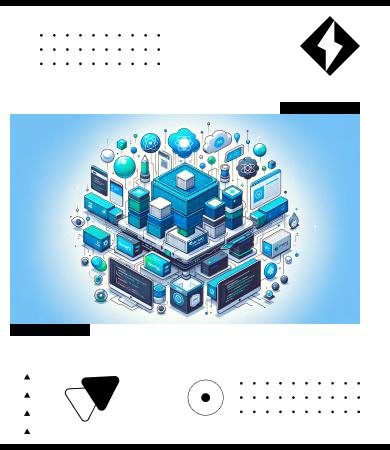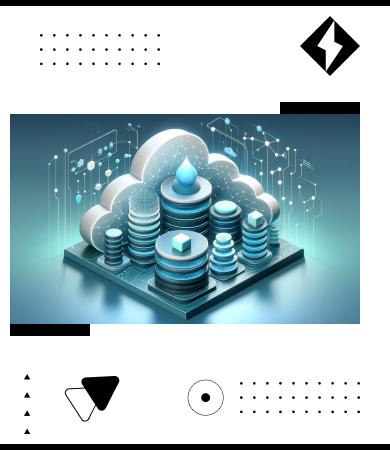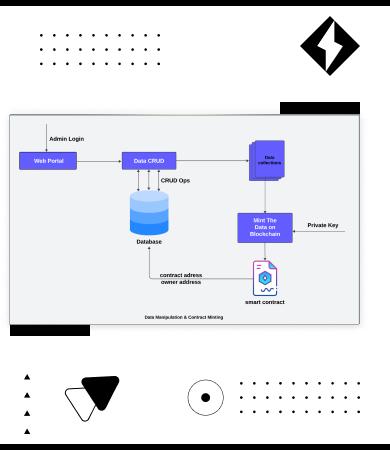Support center +91 97257 89197
Web 3.0December 26, 2023
Blockchain Beyond Cryptocurrencies: Real-World Applications in Web Development

Introduction
In the realm of technology, blockchain has emerged as a revolutionary force, initially gaining fame through cryptocurrencies like Bitcoin and Ethereum. However, its potential extends far beyond the confines of digital currencies. This blog explores the innovative ways blockchain technology is being applied in the field of web development, unveiling its real-world applications that are reshaping how we approach digital solutions.
What is Blockchain?
At its core, blockchain is a distributed ledger technology (DLT) that allows data to be stored globally on thousands of servers. This decentralization means that no single entity has control over the entire network, enhancing security and transparency.

How Does It Work?
A blockchain comprises a series of blocks, each containing transaction data, a timestamp, and a cryptographic hash of the previous block. This chaining of blocks ensures data integrity and immutability, as altering any information would require modifying all subsequent blocks, which is practically infeasible.
Key Features
- Decentralization: Unlike traditional databases, blockchain distributes its data across a network, eliminating single points of failure and enhancing security.
- Security: The use of cryptographic hashing and consensus algorithms makes blockchain incredibly secure against tampering and fraud.
- Transparency: All participants in a blockchain network can view the transactions, fostering an environment of trust and accountability.
Popular Platforms
Blockchain technology has evolved, with platforms like Ethereum introducing the concept of smart contracts, and Hyperledger offering modular blockchain solutions for businesses.
Integrating Blockchain with Web Development
Web development has been traditionally centralized, reliant on servers and databases controlled by a single entity. Integrating blockchain introduces a paradigm shift, offering a decentralized approach to data storage and management.

Use Cases in Web Development
- Decentralized Applications (DApps): Unlike traditional apps, DApps run on a decentralized network, offering increased security and resistance to censorship. They are particularly useful for applications that require trustless interactions, like online voting systems or decentralized marketplaces.
- Smart Contracts: These are programs that automatically execute the terms of a contract when predefined conditions are met. In web development, they can automate processes, like payments or fulfillment of services, without the need for intermediaries.
- Identity Verification and Privacy: Blockchain can revolutionize how user identities are managed online. By giving users control over their data, it enhances privacy and security, making it ideal for services that require identity verification.
Blockchain's integration into web development signifies a shift towards more secure, transparent, and decentralized digital solutions. In the next part of this blog, we'll delve into advanced applications, the challenges faced, and the future prospects of blockchain in web development.
The versatility of blockchain extends to several advanced areas in web development, promising innovative solutions to longstanding challenges.
Tokenization of Assets in Web Platforms
Blockchain allows the digital representation of physical assets, known as tokenization, which can be integrated into web platforms. This technology enables the trading of assets like real estate or artwork in a digital format, opening new avenues for ecommerce and online marketplaces.

Supply Chain Management Solutions
Blockchain can revolutionize supply chain management on web platforms by offering a transparent and immutable record of transactions. This leads to enhanced traceability of products, from manufacturing to delivery, thereby boosting consumer trust and streamlining logistics.
Blockchain for Content Management and Digital Rights
In the realm of content management, blockchain can ensure the authenticity and copyright protection of digital content. It's particularly valuable for platforms dealing with digital media, such as music, video, and e-books, safeguarding creators' rights and revenues.
Despite its potential, blockchain integration in web development isn't without challenges.
Scalability and Performance
One of the biggest challenges is scalability. Blockchain networks, particularly those employing Proof of Work (PoW) consensus mechanisms, can face limitations in transaction processing speed and volume, impacting user experience on web platforms.

Security Concerns and Solutions
While blockchain is inherently secure, its implementation in web development must be done cautiously. Smart contract vulnerabilities and the integration points with existing systems can be potential security risks. Regular security audits and embracing best practices in smart contract development are crucial.
Choosing the Right Blockchain Platform
Selecting an appropriate blockchain platform depends on the specific needs of the web application. Factors like transaction speed, consensus mechanism, and the level of decentralization must be considered. Ethereum, for example, is well-suited for applications requiring smart contracts, whereas Hyperledger might be preferred for private blockchain solutions.
As blockchain technology continues to evolve, its application in web development is bound to expand.
Emerging Trends
We are witnessing the rise of more scalable blockchain solutions, like Ethereum 2.0, which promises to address current limitations. Additionally, the integration of blockchain with other emerging technologies like AI and IoT holds immense potential.
Potential Future Applications
In the future, we might see blockchain being used for more complex web services like decentralized search engines, social media platforms, and more sophisticated DApps. The technology could also play a key role in developing Web 3.0, the next generation of the internet.

Conclusion
Blockchain technology holds the potential to revolutionize the field of web development, offering secure, transparent, and decentralized solutions. While there are challenges, the future looks promising as the technology continues to evolve and integrate with other advanced technologies. For web developers and tech enthusiasts, now is an exciting time to explore and innovate with blockchain technology.
TLDR
This blog explores the expansive applications of blockchain technology in web development, extending far beyond its origins in cryptocurrencies. We delve into how blockchain's key features like decentralization, security, and transparency are being integrated into web development. The blog covers use cases such as decentralized applications (DApps), smart contracts, and identity verification. It also discusses advanced applications like tokenization of assets, supply chain management, and content management. Challenges like scalability, security, and platform selection are addressed. Finally, the blog looks at future prospects, including emerging trends and potential applications in evolving web services and Web 3.0, emphasizing the exciting opportunities blockchain offers for web developers and tech enthusiasts.
FAQs
Blockchain technology in web development introduces decentralized, secure, and transparent solutions. It enables the creation of decentralized applications (DApps), enhances data security, and provides new ways for identity verification and digital rights management.
Smart contracts are self-executing contracts with the terms directly written into code. For web developers, they offer a secure and automated way to handle transactions, agreements, and automate processes without intermediaries, leading to more efficient web applications.
Yes, blockchain can significantly enhance web security. Its decentralized nature makes it less vulnerable to hacking, and the immutable ledger ensures data integrity. This is particularly useful for applications handling sensitive data or transactions.
The main challenges include scalability, as blockchain networks can have limitations on transaction speed and volume. Additionally, finding the right balance between decentralization and performance, and ensuring data privacy while maintaining transparency are significant considerations.
Work with us






